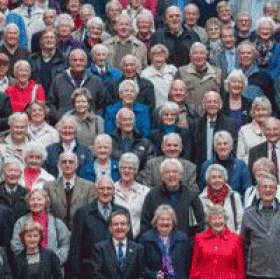Lothian Birth Cohort Reunion

The Lothian Birth Cohorts (LBC) are two groups of people born in 1921 and 1936 who took a test of mental ability at school (Moray House Test) when they were 11 years old. Professor Ian Deary and his team contacted these groups of people and those who were willing were enrolled into the two Lothian Birth Cohorts: LBC1921 and LBC1936. Since then members of these cohorts have taken part in a number of different research investigations including medical examinations, cognitive tests, lifestyle questionnaires, blood tests, ultrasound tests, brain scans and retina examinations. Researchers have been using results from school mental tests taken by participants, combined with studies of individual’s thinking skills and health over the past decade for a major study into why some people’s thinking skills, brains and bodies age better than others.
More than 400 people in their 80s and 90s were reunited at a Lothian Birth Cohort event on 04 June 2017. This reunion celebrated 70 years, to the day, since the LBC1936 participants first sat the Moray House Test as part of the Scottish Mental Survey 1947. The participants of the Lothian Birth Cohorts met with Professor Ian Deary (Centre for Cognitive Ageing and Cognitive Epidemiology) and colleagues behind the project to mark their achievements on the understanding of the ageing brain. They have also reported on their diet, social background, activity and feelings of wellbeing.
The event coincided with a review of the research published in the journal Psychological Medicine. The review shows the research has identified key contributors to brain and cognitive health in older age. These include having particular genetic characteristics, being in good physical condition, being active, being more intelligent in childhood, speaking more than one language, not smoking, and having more education. Researchers found the drivers of cognitive and brain health are many and their individual influences are small. They say the key to successfully tackling cognitive ageing is not by addressing any one of these influences in isolation, but by an inclusive approach which includes many positive factors, all of which have small influences. Researchers said that the contribution of the group is invaluable in advancing their understanding of the ageing brain.
Professor Ian Deary (Director of the Centre for Cognitive Ageing and Cognitive Epidemiology, who leads the study) said: " These anniversaries of Scotland’s national intelligence testing in June 1932 and 1947 are a lovely way to bring these special individuals together to celebrate what they have contributed to ageing science. From the start of the Lothian studies, almost 20 years ago, I’ve made sure that the participants see their basic results before we report them. Of course, it’s also a happy occasion in which to have a good blether and to swap the pleasures and pains of growing older."
Tom Wright (Group Chief Executive of Age UK) said "We are very proud to be funding this unique project which is proving to be an invaluable source of information to help us understand how and why our thinking skills change with age. As we live for longer, we all want to age as well as we can and keep our mental sharpness for as long as possible.The findings from the hundreds of older people involved in these ground-breaking studies will not only help us learn what we can do ourselves to protect our thinking skills as we age, but also what education and health care professionals need to do to provide the best support for healthy cognitive ageing." The charity Age UK has funded the Lothian Birth Cohort 1936 study.

